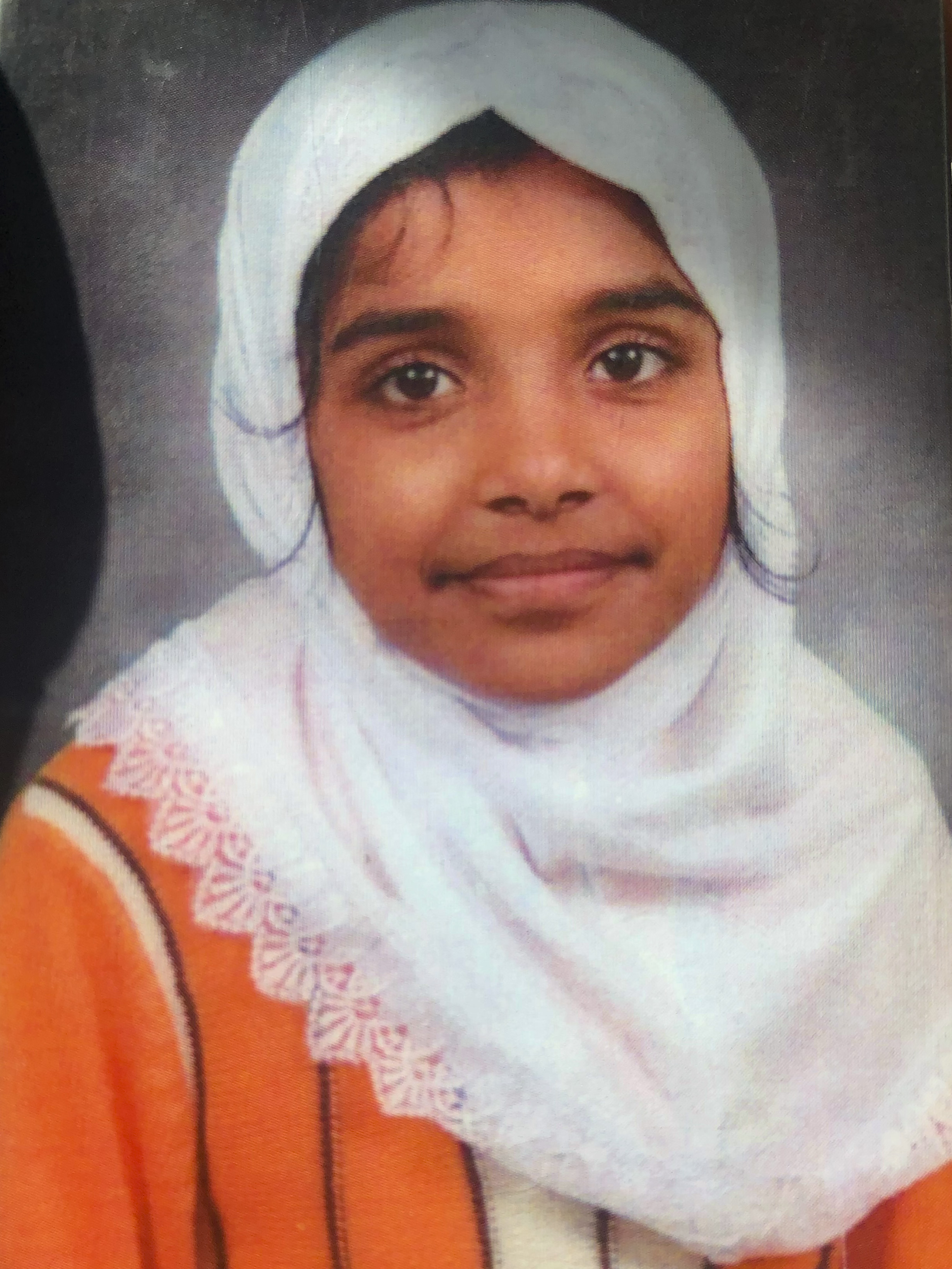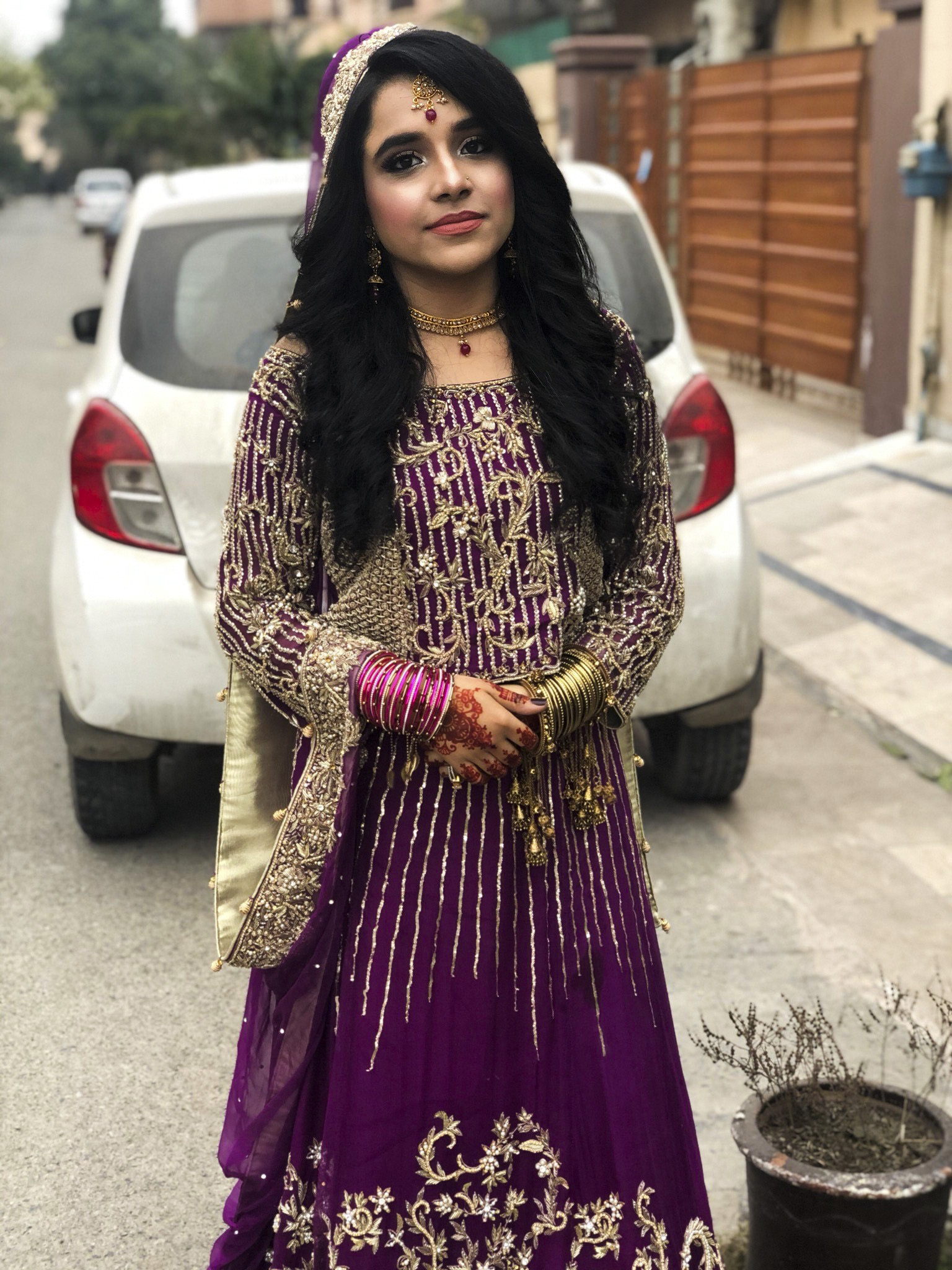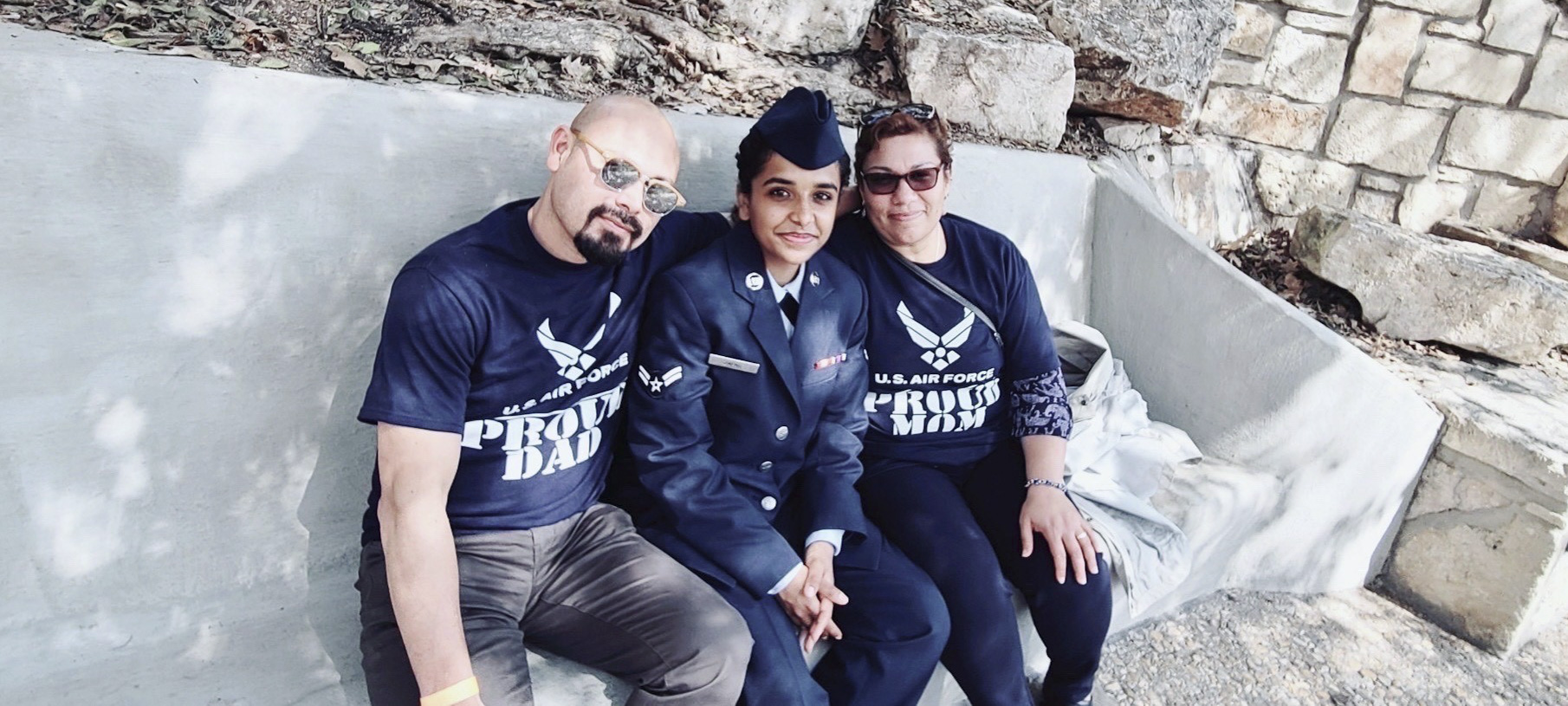KIRTLAND AIR FORCE BASE, N.M. -- Tiny feet shuffle nervously across a dirty sidewalk in the impoverished part of Lahore, Pakistan. A young, tired, yet resilient little girl is heading home where her strictly traditional family awaits her. Her home grows larger as she approaches, just like the expectations of her family and culture looming above her. Slowly nearing the door, the girl grips the knob, inhales deeply, and enters her home to the hustle and bustle of her entire family going about their daily household duties. She drops her school bag and moves into the kitchen to help prepare dinner for the family, one of her many expected duties as a girl in Pakistan. This is the story of Hamna Zafar, how she reclaimed her freedom and became a member of the United States Air Force.
 At 9 years old, Zafar’s family immigrated to the United States to manage their motel business in Maryland. Zafar was thrust into a completely new and overwhelming world and was determined to adapt to her new life. She desperately wanted to learn English so she could communicate better and connect with others at school. She spent countless hours repeating English phrases and sentences she heard during language classes, from her classmates, and on the TV at home. Slowly, but surely, she learned and excelled at school. Although she was in a new country with a completely different culture, Zafar and her family still strictly adhered to their Pakistani traditions. Her family didn’t allow extracurriculars or friends, so she focused her energy at home where she helped her little sister's study, cared for them, cleaned, cooked, and studied hard to do well in school.
At 9 years old, Zafar’s family immigrated to the United States to manage their motel business in Maryland. Zafar was thrust into a completely new and overwhelming world and was determined to adapt to her new life. She desperately wanted to learn English so she could communicate better and connect with others at school. She spent countless hours repeating English phrases and sentences she heard during language classes, from her classmates, and on the TV at home. Slowly, but surely, she learned and excelled at school. Although she was in a new country with a completely different culture, Zafar and her family still strictly adhered to their Pakistani traditions. Her family didn’t allow extracurriculars or friends, so she focused her energy at home where she helped her little sister's study, cared for them, cleaned, cooked, and studied hard to do well in school.
Constantly reminded of her culture and duties, in middle school, Zafar’s mother mentioned she would eventually have an arranged marriage. As a child with other preoccupations, Zafar brushed off her mother’s brief words until winter break of college in 2020.
The cold Maryland wind whipped across Zafar’s face as she hurried home from college. Winter break was starting, and Zafar was tense with anticipation and excitement for her family's upcoming trip to Pakistan. Her heart longed for the familiar comforts of her home country, and she gravely missed her extended family. Growing up Zafar’s family had visited Pakistan regularly to see family and reconnect, so this trip seemed normal and ordinary. On the second day in Pakistan, Zafar’s world changed forever.
“We were home in Pakistan and on the second day there I saw all this jewelry, a fancy dress, and everyone was getting ready for something big,” remembers Zafar. “I’m wondering the whole time about what the heck is going on and my mother finally told me. I was getting engaged.”
Zafar was getting engaged to her first cousin, someone she grew up close with and considered a brother. Riddled with anxiety and shock, Zafar furiously questioned her mother.
“Why didn’t you tell me I was having an arranged marriage while I was in the United States?” exclaimed Zafar. “Why did you wait until I was here?”
Her mother replied that they knew Zafar would say no, so the family planned to take her to Pakistan and tell her on the day of the engagement.
“I’m not doing this. I’m not getting engaged!” argued Zafar.
Her mother solemnly replied that other women in the family had gone through an arranged marriage and if they made it work, Zafar could too.
Realizing arguing was pointless and trying to avoid family conflict, Zafar reluctantly played along with the engagement.

Her nerves remained frazzled until her Pakistan trip ended and she returned to the United States. Relieved to be back, Zafar set out on a mission to regain her freedom from this forced engagement and escape the looming arranged marriage. Heavy luggage slaps against the ground as Zafar drops her belongings and storms into her room. Her fingers fly across her phone screen as she frantically texts her college friends pleading for help, a plan, anything to get out of this engagement.
Her friends were desperate to help her and suggested she join the military. She could have housing, life and health insurance, financial stability, job security, and a family-like support system from her brothers and sisters in arms. Despite knowing nothing about the military, Zafar was sold on the life it could provide her and the possibility of escaping her engagement.
Before she knew it, she found herself standing in a recruiting office. Her nerves were racing but her mind was set. Looking around the daunting office, Zafar squared her shoulders and entered the first military branch she saw: the Navy. She explained her story to the Navy recruiter and expressed her dire need to join immediately.
“I needed to move out or do something because if I wait, I’m going to be sent back to Pakistan to marry my cousin.” recalled Zafar. “The recruiter said, ‘Okay we are starting your paperwork ASAP!’”
The recruiter was extremely sympathetic to Zafar’s situation and worked tirelessly to help. Zafar quickly started the enlistment process with the Navy, passed the Armed Services Vocational Aptitude Battery, and accepted the first job they offered her. Like all new recruits, Zafar needed to attend the Military Entrance Processing Station so she could be cleared to officially join and finally leave behind her nightmare engagement.
The day of her inprocessing appointment arrived quickly, but Zafar’s family was very strict about curfews and coming straight home after school. Knowing her family would never approve of her traveling to another city for MEPS, let alone joining the military, Zafar concocted a plan to sneak off. This would kickstart a whole new set of challenges for her. Zafar told her mother she had an interview for a college scholarship in a different town and that she would be gone all day. Her recruiter drove her to Baltimore where Zafar completed her inprocessing for the Navy. That night she arrived home around 9 p.m., later than she ever had and later than was ever allowed by her parents.
Riddled with nerves, Zafar watched her recruiter drive off and reluctantly entered her home, knowing her mother was already furious and worried. Her mother had been texting and calling all day, and Zafar had ignored her, fearing her mother would know she was up to something. Zafar immediately ran up to her room, hoping to avoid a confrontation, unfortunately her mother had other plans. Zafar froze as her mother flung her bedroom door open and began rapidly questioning her on her whereabouts and why she was home so late. She tried to explain her fake interview had taken longer than expected, but her mother knew she was lying and demanded to see her phone.
Zafar’s heart stopped. All of her Navy plans, pictures with friends, and sneaking around would be discovered. Thump-thump, thump-thump, Zafar’s heart beat hard as her mother’s face contorted with anger. Her mother was infuriated.
“She found everything.” said Zafar. “That night she threatened to send me back to Pakistan and tell my father everything. I knew she was being serious, and I knew that if I went back to Pakistan I would never be allowed to come back to the United States.”
Knowing the fate of her future depended on her next move, Zafar made the decision to run away, to take her life, her choices, and her freedom back.
“I called my recruiter as soon as my mom left my room. I said, ‘We need to do something because I’m about to be sent back to Pakistan and I won’t be able to come back’.” Zafar emotionally recalled.
Zafar’s recruiter came to her aid that night. Hastily packing everything she could, Zafar quietly snuck through her house, her heart rushing from fear and adrenaline. With her Navy recruiter waiting in a get-away car, Zafar held the back door open, gave her home one last look, and then faced forward to head towards her new future.
Two long months of living alone in a hotel [during the beginning of the COVID-19 pandemic] with no family support, Zafar was nervous about her future. After the night of her getaway, she had used leftover college scholarship money to survive in the hotel and was quickly running out of funds. It was taking longer than expected to receive a basic training date and she was beginning to second guess her decision to run away from her family and the arranged marriage.
“I wondered if I had made a mistake.” said Zafar. “The pandemic was happening, I was alone, and I just kept wondering if I should go back home and marry like my family wanted. I didn’t agree with it, and I didn’t want to, but I felt lost in those two months.”
Zafar had repeatedly tried reaching out to her family to reason with them, but they were furious with her. In Pakistan, culture and tradition dictate that families can honor kill a family member if they believe they have brought dishonor upon the family. Zafar’s family firmly believed she had dishonored them by refusing the arranged marriage.
“My cousins said awful things to me, but I know they would never actually do anything to me. I’ve heard of women getting killed from becoming a disgrace and it was seen as normal,” recalled Zafar. “Things have changed a bit, but at the same time in Pakistan it is normal to punish women for bringing disgrace to the family.”
Although Zafar’s family was not this extreme, it was still a very real threat that she couldn’t help thinking of.
“My own mother told me she wished I would burn in hell fire.” Zafar heartbrokenly remembers. “My father wanted nothing to do with me and my cousin was furious I wasn’t going through with the marriage. I needed support and I had none.”
Zafar’s saving grace would come in the form of Claudia Barrera and the Barrera-Abarca family. One of Zafar’s college friends had told his family about her story and how she was living alone in a hotel. Mrs. Barerra’s heart ached for Zafar, and she was worried about her. Her motherly instincts and compassion urged her to reach out to Zafar and offer her a place in their home.
“She [Claudia] took me back to their house and asked me what happened,” shares Zafar. “I told her everything about the engagement, the arranged marriage to my cousin, and then joining the Navy to get away. She told me I could live with them for as long as I want, do whatever I needed to do to get my degree, and that I didn’t have to join if I wasn’t ready to.”
Zafar was eternally grateful for Claudia Barrera and the family’s kindness. With a place to live, and a calming mother figure to guide her, Zafar decided it was not the right time in her life to join the Navy.
The Barrera-Abarca’s hosted Zafar in their home while she finished her associate degree in 2022. During this time, Zafar had been working a few different jobs, learning the intricacies of adulthood, and figuring out who she was. She felt she needed a career, a purpose, and something more than what she had been doing. After all the challenges Zafar had faced, she still found herself turning to the military.
“I wasn’t benefitting from the jobs I was working, and I thought maybe the military is the way to go,” Zafar remembers. “Claudia said I should try joining the Air Force because she had always wanted to join. She said the Air force is a good branch to join.”
 With the support of her new family, the Barrera-Abarca’s, Zafar raised her right hand and swore into the service of the United States Air Force. Zafar graduated from the Air Force basic military training in March 2022. Yearning to reconnect with her family, she reached out again to her parents and invited them to her graduation. Her old family was still very angry and ignored the invitation, but Zafar’s new family, the Barrera-Abarca’s, were very proud of her. They attended Zafar’s graduation and showered her with much-needed love and support.
With the support of her new family, the Barrera-Abarca’s, Zafar raised her right hand and swore into the service of the United States Air Force. Zafar graduated from the Air Force basic military training in March 2022. Yearning to reconnect with her family, she reached out again to her parents and invited them to her graduation. Her old family was still very angry and ignored the invitation, but Zafar’s new family, the Barrera-Abarca’s, were very proud of her. They attended Zafar’s graduation and showered her with much-needed love and support.
“I am so proud of myself and the reason I’m successful is because this family gave me a place in their home,” Zafar fondly recalled. “For her [Claudia] to trust me, to give me a place to live, and to love me, means everything to me.”
Because of this family, Zafar’s resolve was strengthened as she began her military law enforcement career with her new Air Force family in New Mexico.
Tightly laced boots confidently stride across a well-kept sidewalk at Kirtland Air Force Base, New Mexico. Still tough and resilient, Airman 1st Class Hamna Zafar reports for duty at the 377th Security Forces Squadron where her fellow defenders await her. Nearing the entrance, Zafar steps through the threshold and greets her busy coworkers as she proceeds to the armory. Donning her vest and weapon, she prepares for her daily duties as an Airman in the United States Air Force.
A young woman originally from Pakistan who never knew the real meaning of freedom, has finally regained her own and now spends her days defending the freedom of others.